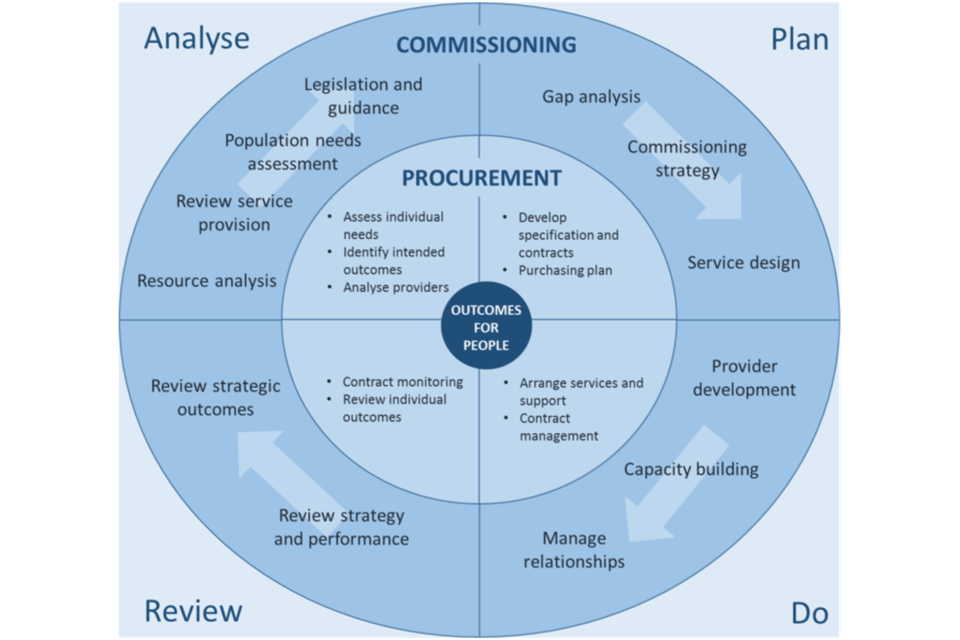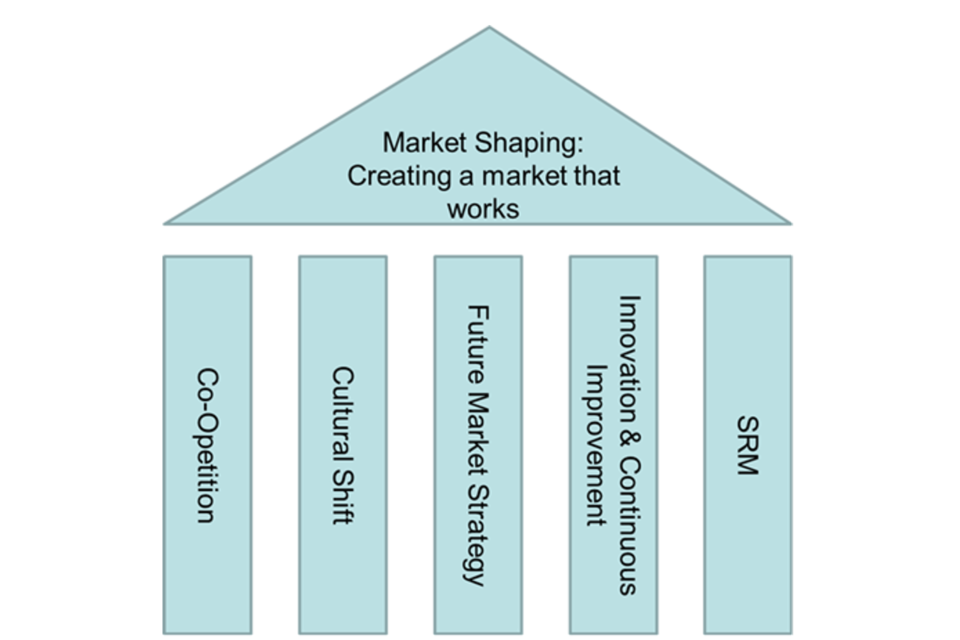DWP Employment Provision Commissioning Strategy 2021: high-level overview
Published 9 December 2021
Executive Summary
There are important links between the Health and Employment sectors. The government’s Improving Lives: the Future of Work, Health and Disability report sets out the strategy for an improved, joined-up approach across three key settings – the welfare system (including employment provision), the workplace and the healthcare system. In this report, the government have laid out their intentions for a 10-year programme of change to see one million more disabled people in work by 2027.
This Employment Provision Commissioning Strategy sets out how the Department for Work and Pensions (DWP) Employment Category will support those intentions and commission services to support the welfare system and employment. This will include assessing whether services should be delivered in-house or contracted out and encourages DWP Employment Category (“the Category”) and our suppliers to deliver outcomes, focussing on 4 key areas: Value for Money, Leadership, Market Management and Innovation and Continuous Improvement whilst recognising best practice in areas like social value and environmental management.
This Commissioning Strategy, supported by commercial processes and learning from evaluation data, provides a framework to enable DWP Employment Category to commission intelligently and consistently and is a way of working within this landscape to achieve our objectives, setting out our market and provider expectations in advance so we move more quickly to efficient, effective, high quality, high performance delivery.
The Category will identify the best value approach to delivering these objectives. This includes whether or not the Department has its own capacity and capability to deliver the services alongside its other existing services, or consider, if the case is compelling, whether to externally contract provision in the most appropriate way including the use of existing contracts and frameworks available across government or, if alternative vehicles are required, via new procurement activity.
The Employment Category plays a crucial role in driving DWP’s agenda: Early engagement with stakeholders and use of market intelligence and other insights are critical to delivering better commercial outcomes. We want to break down the barriers between services and develop, deliver and commission a range of high quality and accessible Employment support to our citizens.
To realise our aim for a range of high quality and accessible Employment support to our citizens, we will follow these 5 aims.
| Aim 1 | Value for Money – The Category needs to spend ethically, strategically and set targets and Key Performance Indicators for procurement and contract management. |
|---|---|
| Aim 2 | Leadership – To deliver our strategy and programmes, the Category will demonstrate effective leadership to increase its impact and influence across the employment sector. |
| Aim 3 | Market Management – To talk to the market and engage early. Understand the deliverability of our requirements, the feasibility of alternative options and ways to innovate that could help the delivery of better services. To encourage new entrants into the employment market to allow growth and expertise and facilitate Small and Medium Enterprise (SME) suppliers to thrive, whilst protecting the capacity and capability of the market so we retain a balance of existing providers and new. |
| Aim 4 | Innovation and Continuous Improvement – To deliver better innovation and continuous improvement through our procurement activity and during contract life, modernising in terms of scope, use of technology and procedures. |
| Aim 5 | Delivery – contracts and providers exceed delivery expectations set out in contracts in terms of quality and performance and drive continuous improvement in the service and the impact on the economy and environment. Programme participants are the heart of all we do. |
The Sourcing Playbook set out practical guidance to support delivery and drive improvement for key policies.
The diagram below sets out the high level considerations undertaken by the Category, DWP and wider government as part of their commissioning framework.
Figure 1: Representation of the various factors that play into both the Commissioning and Procurement cycles

" "
Commissioning
Plan includes:
- gap analysis
- commissioning strategy
- service design
Do includes:
- provider development
- capacity building
- manage relationships
Review includes:
- review strategy and performance
- review strategic outcomes
Analyse includes:
- resource analysis
- review service provision
- population needs assessment
- legislation and guidance
Procurement
Plan includes:
- develop specification and contracts
- purchasing plan
Do includes:
- arrange services and support
- contract management
Review includes:
- contract monitoring
- review individual outcomes
Analyse includes:
- assess individual needs
- identify intended outcomes
- analyse providers
In the centre of the figure is outcomes for people.
Market Shaping
Our aim is to develop a market that drives competition during a procurement and will deliver innovation and collaboration in live running to maximise learning and service delivery. We also seek to encourage new suppliers into the Employment Market with the aim of the Category becoming a key customer of choice with whom the market wishes to contract and creating a market that works and provides the services required.

" "
Market shaping: creating a market that works:
- coopetition
- cultural shift
- future market strategy
- innovation and continuous improvement
- SRM
Future Commercial Opportunities – Working with the DWP Employment Category
To realise employment objectives, and deliver strong and sustainable performance and quality across outcome measures and diverse customer groups, value for money, the ability to operate a sound control environment, rapid deployment to changing conditions, innovation, and flexibility will always be central to our approach.
- Social Value will be fully integrated into our commissioning. We will be clear about our Social Value expectations and how these will be assessed in our tender evaluation and throughout the contract lifecycle
- environmental impact and Carbon Neutral will be a key requirement on our larger contracts
- transparency and honesty are behaviours we will embrace and expect at all stages of the commercial relationship including through bidding stages and during the life of contracts. We expect all current and future suppliers to, as a minimum, DWP Employment Category Supplier code of Conduct
- we will give an ongoing consideration to how our commissioning can support the objective of economic growth. This includes how we support and engage with SMEs and organisations orientated around social-enterprise (including charities and not-for-profit organisations) either directly or through the supply chain, and working at the local level with employers, stakeholders, and devolved partners
To achieve strong and sustainable performance and quality services we need a diverse, open and vibrant market at all levels. The Social Value Act created a requirement for commissioners and contracting authorities to consider at the pre-procurement stage the relevant wider economic, environmental and social benefits of what is proposed to be procured. This includes, but is not limited to:
- effectiveness and efficiency through ensuring the market is competitive and resilient; and
- commitment to ensuring there continues to be diversity in the market, with the public, private, voluntary, community and social enterprise sectors delivering
We seek to create regular opportunities at all levels through our commissioning. This will create a range of opportunities for both larger and smaller suppliers.
- we will systematically publish the commercial pipeline, enabling interested parties to plan and build capacity, capability, alliances and partnerships. Furthermore, it will allow time for interested parties to develop and build credible scenarios and evidence bases to support their proposals
- where we commission programmes at the largest scale we believe that nationally-commissioned, centrally-designed and managed programmes, with locally tailored delivery and the use of a prime contractor model offers efficiency and effectiveness. We may use this as a default route to market, from Summer 2020 for 5 years, for these types of provision although we will always assess the most appropriate route before embarking on any procurement initiative
- where we commission more specialist services, particularly for those furthest from the labour market or for those with more complex barriers such as disability and health conditions, we may utilise different commissioning models. This includes the use of smaller scale, localised contracts where appropriate. Smaller-scale contracts may be procured as trials or proofs of concept through The Category and Jobcentre Plus, or by a third-party on DWP’s behalf using a Dynamic Purchasing System (DPS). Where we commission suppliers directly through our Jobcentre Plus network, we expect to purchase using a mix of national or regional commercial frameworks with some single procurements, around which there will be greater flexibility
- we will standardise the use of Common Procurement Vocabulary (CPV) code 80000000 as a base code to allow interested organisations to quickly identify our potential procurement opportunities
- we will issue an Employment Category Newsletter on a quarterly basis to current and potential suppliers
- we will collect market intelligence to inform our Future Market Strategy
- we will also test innovative solutions to delivering our specialist services to build our commissioning expertise and evidence base. To support this, we will build and implement a Commercial “Test and Learn” Strategy. This Strategy will seek routes to market that:
- are flexible and responsive to new ideas from the marketplace and the emerging evidence needs of government
- build in appropriate commercial and financial opportunities for both the Department and suppliers; and
- incentivise the marketplace to play an active role in the development of future provision through a test and learn approach
- we will embrace best practice and seek to early adopt changes in policy and process, for example, Procurement Policy Notices
This approach is consistent with the Sourcing Playbook whilst having the interests of the programme participant at the heart of all we do.
We are committed to furthering our understanding of the smaller, specialist supplier base so that we can ensure we are getting best value from this part of our market in line with our changing focus.
We will seek to ensure that the characteristics of our commercial opportunities are suitable for a variety of suppliers and aligned to the outcomes desired.
- we recognise that contracts should be of sufficient length to give suppliers the security to invest, develop their delivery models and their partnerships
- contract structures (“Contract Package Areas”) for larger scale programmes will rarely allow for fully aligned boundaries with all our potential partners. We will seek to develop contract structures that enable co-commissioning and encourage joint working between our suppliers and potential non-contractual partners such as other public service commissioners
Ultimately, we will act as an advocate of the market and seek to engage, support and manage all parties to our commercial agreements including both suppliers and the Department, acting as honest broker holding both parties to account.
